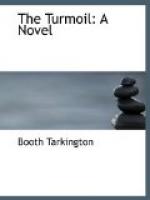“Then come—if you care for organ music. The organist is an old friend of mine, and sometimes he plays for me. He’s a dear old man. He had a degree from Bonn, and was a professor afterward, but he gave up everything for music. That’s he, waiting in the doorway. He looks like Beethoven, doesn’t he? I think he knows that, perhaps and enjoys it a little. I hope so.”
“Yes,” said Bibbs, as they reached the church steps. “I think Beethoven would like it, too. It must be pleasant to look like other people.”
“I haven’t kept you?” Mary said to the organist.
“No, no,” he answered, heartily. “I would not mind so only you should shooer come!”
“This is Mr. Sheridan, Dr. Kraft. He has come to listen with me.”
The organist looked bluntly surprised. “Iss that so?” he exclaimed. “Well, I am glad if you wish him, and if he can stant my liddle playink. He iss musician himself, then, of course.”
“No,” said Bibbs, as the three entered the church together. “I—I played the—I tried to play—” Fortunately he checked himself; he had been about to offer the information that he had failed to master the jews’-harp in his boyhood. “No, I’m not a musician,” he contented himself with saying.
“What?” Dr. Kraft’s surprise increased. “Young man, you are fortunate! I play for Miss Vertrees; she comes always alone. You are the first. You are the first one ever!”
They had reached the head of the central aisle, and as the organist finished speaking Bibbs stopped short, turning to look at Mary Vertrees in a dazed way that was not of her perceiving; for, though she stopped as he did, her gaze followed the organist, who was walking away from them toward the front of the church, shaking his white Beethovian mane roguishly.
“It’s false pretenses on my part,” Bibbs said. “You mean to be kind to the sick, but I’m not an invalid any more. I’m so well I’m going back to work in a few days. I’d better leave before he begins to play, hadn’t I?”
“No,” said Mary, beginning to walk forward. “Not unless you don’t like great music.”
He followed her to a seat about half-way up the aisle while Dr. Kraft ascended to the organ. It was an enormous one, the procession of pipes ranging from long, starveling whistles to thundering fat guns; they covered all the rear wall of the church, and the organist’s figure, reaching its high perch, looked like that of some Lilliputian magician ludicrously daring the attempt to control a monster certain to overwhelm him.
“This afternoon some Handel!” he turned to shout.
Mary nodded. “Will you like that?” she asked Bibbs.
“I don’t know. I never heard any except ‘Largo.’ I don’t know anything about music. I don’t even know how to pretend I do. If I knew enough to pretend, I would.”
“No,” said Mary, looking at him and smiling faintly, “you wouldn’t.”




